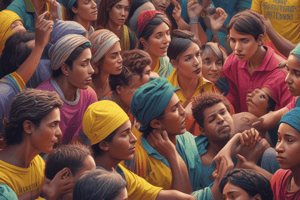Podcast
Questions and Answers
Amnesty International is a global movement with more than 15 million members.
Amnesty International is a global movement with more than 15 million members.
False (B)
The current Global Strategic Framework for Amnesty International covers the years 2021 to 2029.
The current Global Strategic Framework for Amnesty International covers the years 2021 to 2029.
False (B)
Amnesty International is governed by its individual members through a democratic process.
Amnesty International is governed by its individual members through a democratic process.
True (A)
Amnesty International’s core principles include democratic participation and global solidarity.
Amnesty International’s core principles include democratic participation and global solidarity.
Amnesty International is funded by political ideologies and religious institutions.
Amnesty International is funded by political ideologies and religious institutions.
Children can experience discrimination based solely on their age.
Children can experience discrimination based solely on their age.
Child participation means children's opinions should be taken seriously in decisions affecting them.
Child participation means children's opinions should be taken seriously in decisions affecting them.
The right to participation applies equally to all ages, including very young children.
The right to participation applies equally to all ages, including very young children.
Special efforts are unnecessary to include the views of marginalized children.
Special efforts are unnecessary to include the views of marginalized children.
Discrimination against children can take the form of distinctions or restrictions based on various factors.
Discrimination against children can take the form of distinctions or restrictions based on various factors.
Flashcards are hidden until you start studying
Study Notes
Amnesty International Overview
- Global movement with over 10 million members advocating for human rights.
- Operates independently, free from political, economic, or religious affiliations.
- Aims for a future where human rights are enjoyed universally, guided by principles of impartiality and democracy.
- Funded by member contributions, focusing on accountability for human rights violations.
- Decisions made democratically at the Global Assembly with representatives from over 60 countries.
Core Values and Mission
- Encompasses international solidarity, global coverage, and the indivisibility of human rights.
- Strategic framework from 2022 to 2030 designates human rights priorities.
- Committed to addressing discrimination faced by children based on multiple intersecting factors.
Child Participation
- Children’s voices should be respected and influence decisions affecting them.
- Linked rights include freedom of expression, thought, privacy, and information access.
- Participation rights extend to all children, with extra efforts needed for marginalized groups.
- Collective participation example: Fridays for Future, initiated by Greta Thunberg, highlighting youth awareness on climate change.
Government Obligations
- States must undertake legislative and administrative measures to uphold the Convention on the Rights of the Child.
- Responsibilities include evaluating social services and creating protective laws for children.
- Mandatory education for children about their rights and support systems for parents.
National Human Rights Institutions (NHRIs)
- NHRIs monitor and promote the implementation of human rights standards.
- They support human rights defenders and foster a culture of human rights.
- Engage in activities related to human rights and climate action.
Universal Periodic Review (UPR)
- UPR is a UN Human Rights Council review mechanism assessing member states’ human rights records every five years.
- Recommendations made during UPR sessions are non-binding but serve as a tool for accountability.
- Increasing focus on climate change and its human rights impacts in UPR recommendations.
Accountability Mechanisms
- International, regional, and national systems exist to monitor human rights compliance.
- Victims can seek justice, compensation, and reparation through various courts.
- Human rights complaints related to climate change can involve both inactivity and harmful actions by the state.
Legal Challenges in Climate Change and Human Rights
- Applicants can argue violations stem from state inaction on climate change or specific harmful actions.
- Successful legal action requires finding an appropriate adjudicative body and proving standing.
- Evidence of human rights violations must connect to state actions or failures regarding climate policy.
Studying That Suits You
Use AI to generate personalized quizzes and flashcards to suit your learning preferences.





